
12 Truths of Knowing and Not Knowing

Summary: Thoughts for contemplation on the problem of knowing and not knowing and limitations of our knowledge and perception.
Since the dawn of civilization, human beings have had trouble knowing the reality around them with their faculties. The problem still exists. It is not because our education is defective, or we have not tried enough. It is because human beings are created as such. By design, we are finite beings with finite capacities. The planet cannot support life forms that exist forever.
The human mind resorts to shortcuts in knowing and comprehending to save time and energy. In the process, the knowledge it acquires or processes becomes compromised. The following are a few important reflections concerning knowledge, perception, knowing and not knowing. Please think about them deeply and draw your own conclusions. They are useful to cultivate tolerance, humility, an open mind and the understanding that truth is relative to the knower and his or her knowledge and experience.
Limits to knowledge
There are limits to human knowledge just as there are limits to the mind and senses. The all knowing awareness does not arise in us. Because of our physical and mental limitations, we cannot see far, nor think forever. While we may take pride for our achievement and little acts of greatness, our journey is limited to a brief moment in the history of the universe. Yet, it is not an excuse for us to remain indifferent or do nothing. We have a universe within, which awaits our exploration, study and understanding. It is where we have the hope to find innumerable truths of our lives and freedom from the shackles of existence.
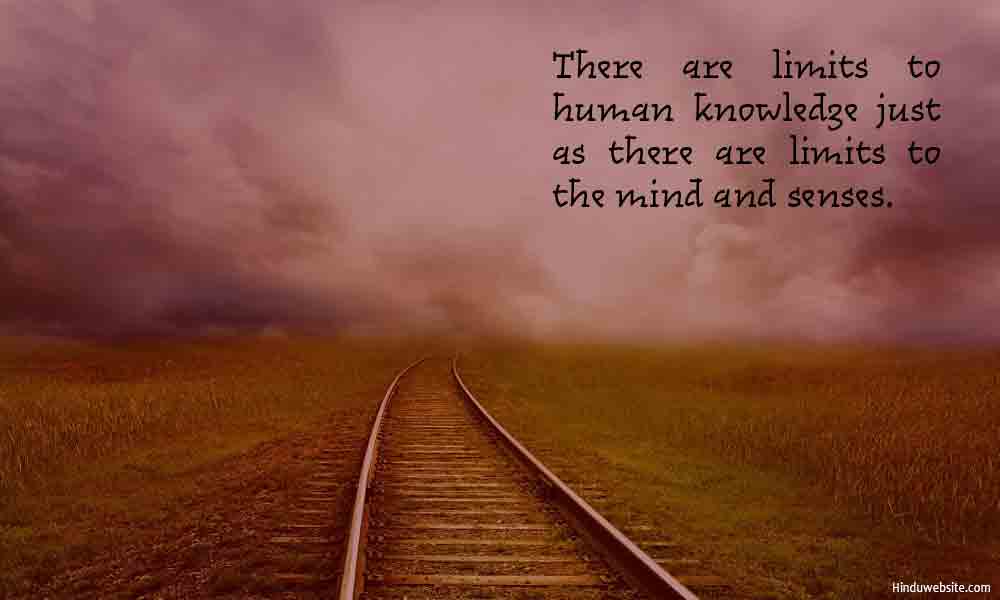
Three factors in seeking knowledge
In seeking knowledge three factors are important, what you want to know, the method of knowing and the truth of it. They in turn depend upon our desires, attachments and priorities. Different people seek different things in life and may resort to different methods. Hence, their knowledge is never the same and they all do not see the world in the same manner. All the three factors are important, however the last one should be the goal and the first two should be the means which lead to the truth of things we know, study and observe. Any pursuit of knowledge without commitment to truth leads to delusion and ignorance.
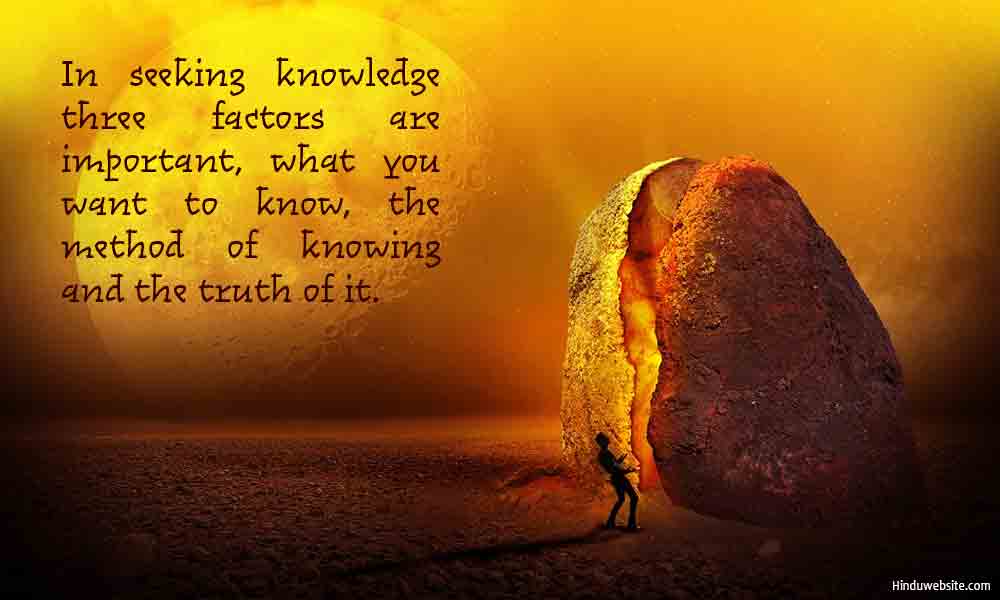
What is and what is knowable
Learning is the mind’s feeble attempt to bridge the gap between what is and what is knowable. What is, or the reality of our existence, or the nature of things in their universality, is vast, unfathomable and infinite. Our minds can only grasp a minute part of it. Hence, the reality and what we know as "the reality" represent two truths. When they differ widely, we suffer from delusion or illusion, and what the scripture call ignorance. We should try to bridge the gap to the extent possible, by clearing the mind of its deficiencies and impurities.

The knower
In the process of knowing, the knower is the barrier and the limitation. Without knower, knowing is not possible, but with him, knowing is compromised. Knowledge and perception depend upon the person, his or her state of mind, learning, intelligence, desires, attachments, beliefs, familiarity with the perceived reality and so on. Therefore, if you want to know better, you must become better through self-transformation by cultivating detachment, sameness, nonjudgmental awareness and equanimity.
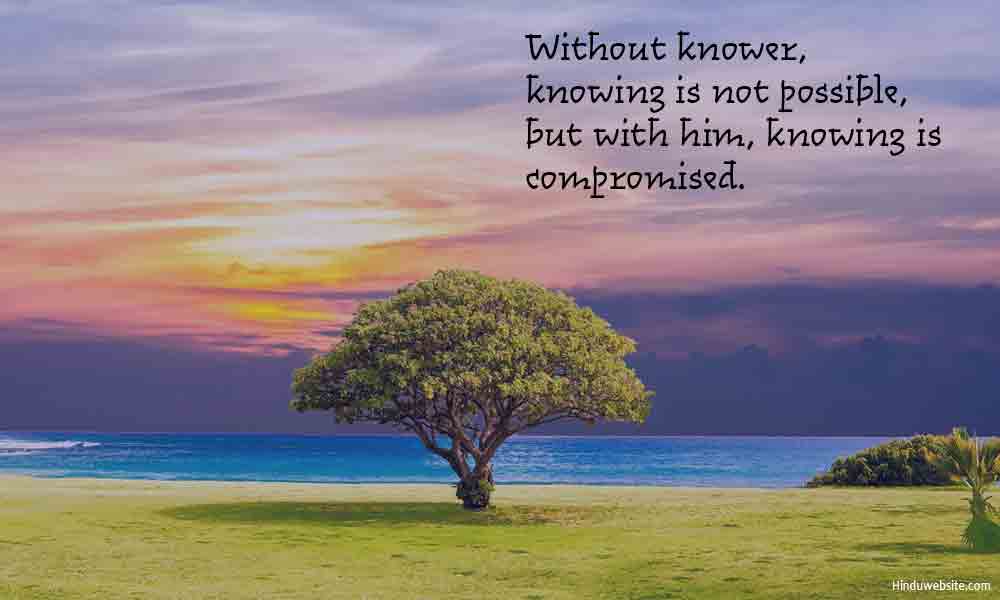
You are the barrier to knowledge
You are the limiting factor in your quest for knowledge. You stand in the way of your knowing and perceiving. To the extent you become involved with the field of observation or activity, you deny yourself true knowledge and discernment. To overcome this problem, one has to practice self-control, restrain and withdraw the mind and senses, silence the mind and ego and become a passive witness.
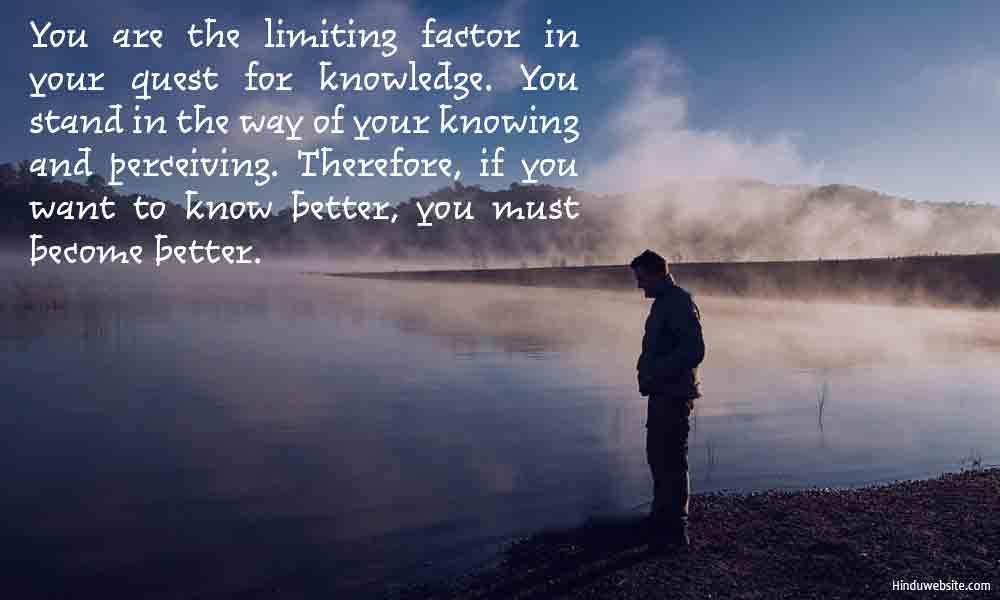
What is known to you
What is known to you is known to you only. Others may know it but differently. Although we live in the same world and conditioned by it to adhere to certain norms, we experience the world differently according to our circumstances, knowledge, awareness and personality factors. Accordingly, our perceptions, knowledge and intelligence also differ and thereby our worldviews, priorities, preferences and approaches. We must embrace this uniqueness, and at the same time recognize and respect the uniqueness of others.
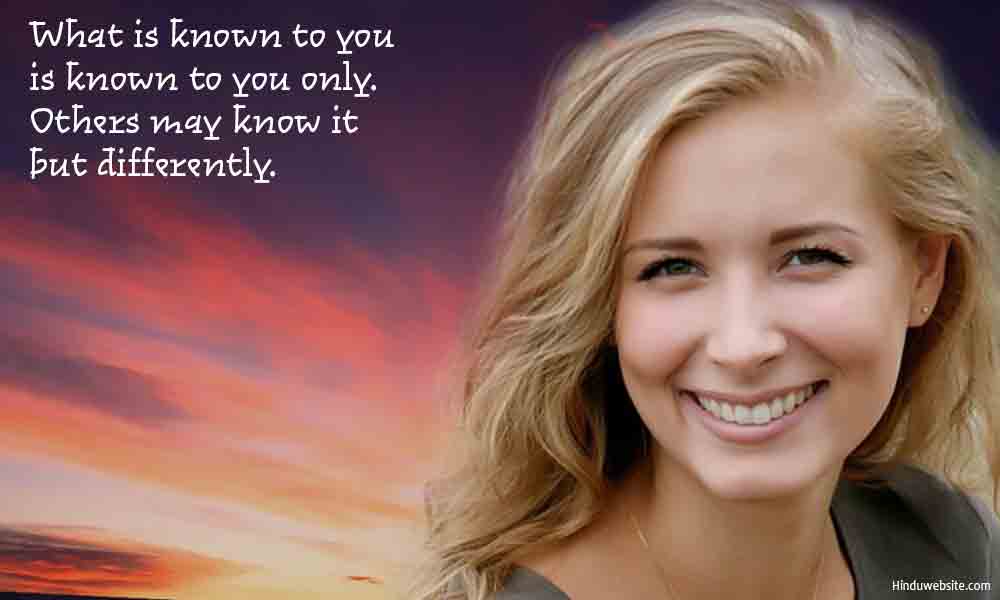
Perception
Perception is mostly becoming aware of what you already know. The moment you see something, your mind begins to compare, contrast and categorize it according to the known or memorial knowledge. In other words, perception depends upon memory to cognize the objects and make sense of them. Without the aid of memory, perceptions will remain incomplete or unregistered. It is a blessing as well as a hindrance. It is a hindrance because most of the time you hardly see the object, but rather a memory or stored impression of it. The same thing happens to our relationships. We do not generally see people but our impressions of them.

Experience
Experience is an illusion because events and perceptions are always dissimilar. No event or experience of the event ever repeats itself in exactly the same way. Repeated experiences of the same object or event may be similar but the not the same. In mindfulness, the observer has the advantage of seeing the distinct feature of each experience and better chances of cultivating discernment and right knowledge. Acknowledging the uniqueness of each experience is key to the practice of mindfulness and staying in the present.

Reality and thinking
The mere fact that something exists does not mean it exists as you think it exists. Things exist as being things in the external world with certain essential features or properties, but in our minds as mental constructs or ideas, which are unique to our states of mind, knowledge and other personal factors and which do not necessarily correspond with the real things of existence because any knowledge that depends upon your mind may be real or delusive, depending upon your subjective state. Hence, you cannot totally rely upon it.

Awareness
Your knowledge is limited by your awareness, and your awareness is limited by your knowledge. Both are limited by you. To be aware of something does not necessarily mean you have the right knowledge of it, unless you have addressed the fundamental problems we have with perception, experience and knowledge. It is difficult to say whether knowledge leads to awareness or awareness leads to knowledge. Perhaps both reinforce each other. However, right knowledge is the foundation of right awareness. Both arise in the field of experience when the mind is freed from its usual impurities.

Subject and object
In knowing, the object partakes the nature of the subject to the extent the subject is involved with the object. You pay particular attention to particular aspects of the things you observe according to your likes or dislikes or your desires and attachments. Therefore, although you may gather the impressions and images of the external world, they become modified by you or your mind. It can often lead to many problems in your life. Unless you withdraw from the field of observation and uninvolve yourself, you cannot see things as they are and cultivate right knowledge.
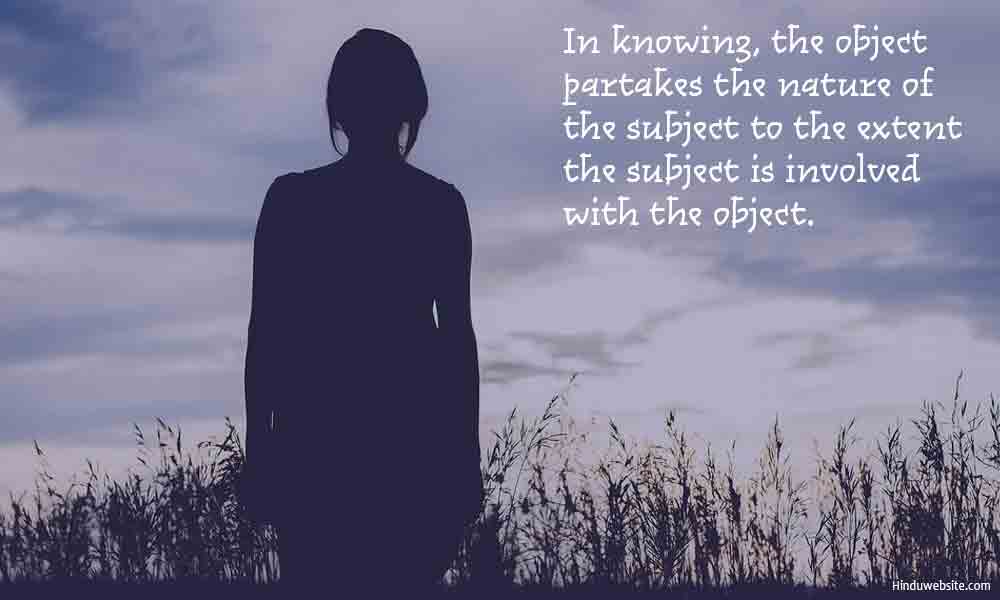
Reason and desire
When, reason is twisted by desire, truth is compromised. The Buddha rightly recognized that desires are at the root of suffering. Desires clog our minds and impair our perception, judgment and discretion, without which there can be no right awareness or right knowledge. Prejudice, rationalization, generalization, logical fallacies, hidden agendas, self-deception, self-induced delusions, self-denial, etc., are products of twisted reason only. Understanding your desires and motivation and resolving them are critical to arrive at the truth of things and see them as they are.
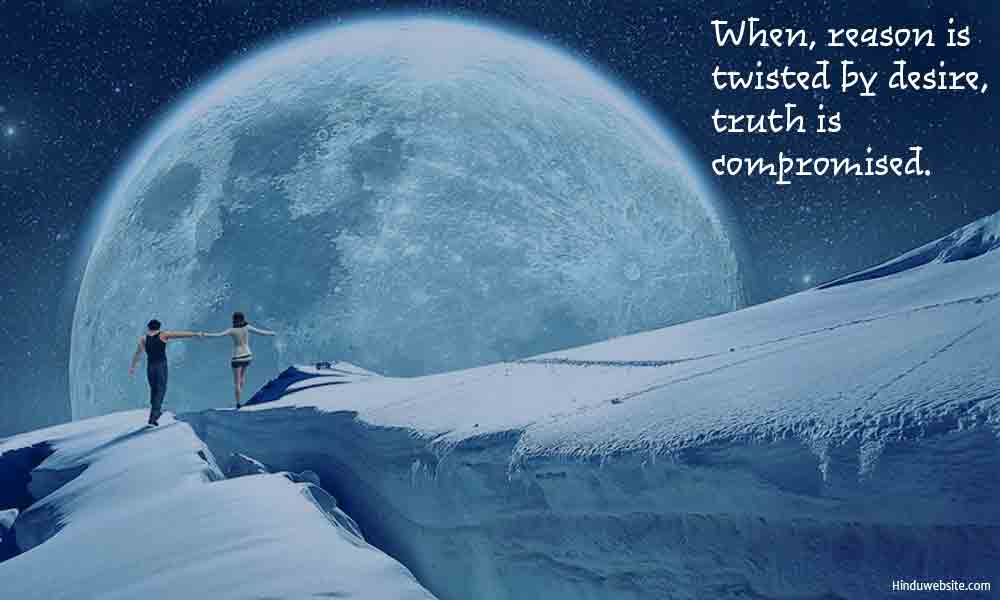
Conclusion
Our knowledge is meant to help us survive in a complex world without burdening us with the weight of excess knowledge or unnecessary knowledge, which may slow us down in responding to external threats or distract us from them. In routine matters, the mind prefers quick solutions, mechanical and instinctive responses and surface thinking on need to know basis as part of your survival instinct. To the extent possible it ignores the complexity and confines itself to the obvious and the apparent. If you want to be a true seeker of knowledge, your search for truth must begin from within, with self-transformation as the first step. It is by clearing the mind from its usual fallacies, by paying attention and reflecting deeply upon the things observed or experienced that knowledge becomes refined and purified and gains the light of truth and wisdom. In most cases, knowledge remains unprocessed. As a result, many remain ignorant and delusional, while believing themselves to be wise and knowledgeable.
Suggestions for Further Reading
- The Symbolism of Snakes and Serpents in Hinduism
- Ten Distinguishing Features Of Hinduism
- Ten Reasons Why You Should Worship Shiva
- The River Sutra - Lessons From the River
- The Ten Main Duties (dharmas) in Hinduism
- The Ten Manifestations Of Sattva in Hinduism
- The 12 Manifestations of Brahman, the Supreme God of Hinduism
- Ten Teachings of the Buddha From the Dhammapada
- The Meaning And Significance Of Swastika In Hinduism
- What is Prana? The Five Types of Breath
- Hinduism and the God of Death
- Om, Aum, Pranava or Nada in Mantra and Yoga Traditions
- Wealth and Duty in Hinduism
- Hindu Gods - Lord Ganesha
- Symbolism and Significance of the Descent Of Ganga
- Symbolism of Ganga As the Purifier and Liberator
- The Meaning and Significance of Heart in Hinduism
- The Origin and Significance of the Epic Mahabharata
- Yin and Yang, and the Hindu Connection
- Symbolism in the Story of Sagar Manthan, the Churning of The Ocean
- The Symbolic Significance of Puja Or Worship In Hinduism
- Essays On Dharma
- Esoteric Mystic Hinduism
- Introduction to Hinduism
- Hindu Way of Life
- Essays On Karma
- Hindu Rites and Rituals
- The Origin of The Sanskrit Language
- Symbolism in Hinduism
- Essays on The Upanishads
- Concepts of Hinduism
- Essays on Atman
- Hindu Festivals
- Spiritual Practice
- Right Living
- Yoga of Sorrow
- Happiness
- Mental Health
- Concepts of Buddhism
- General Essays